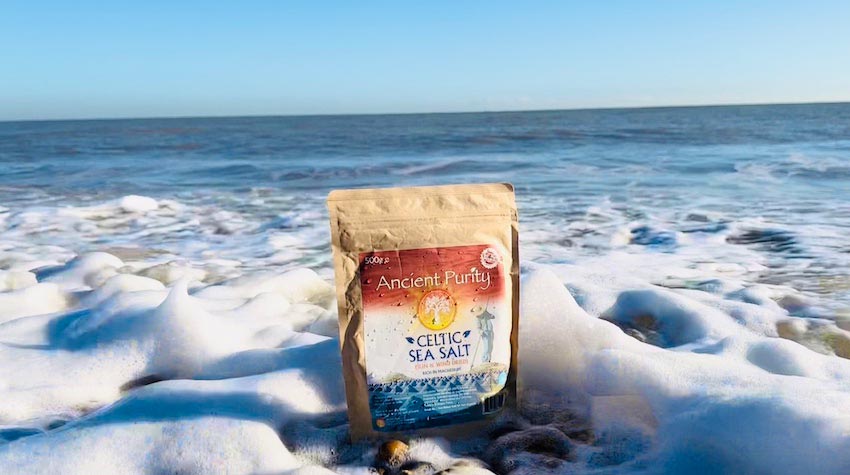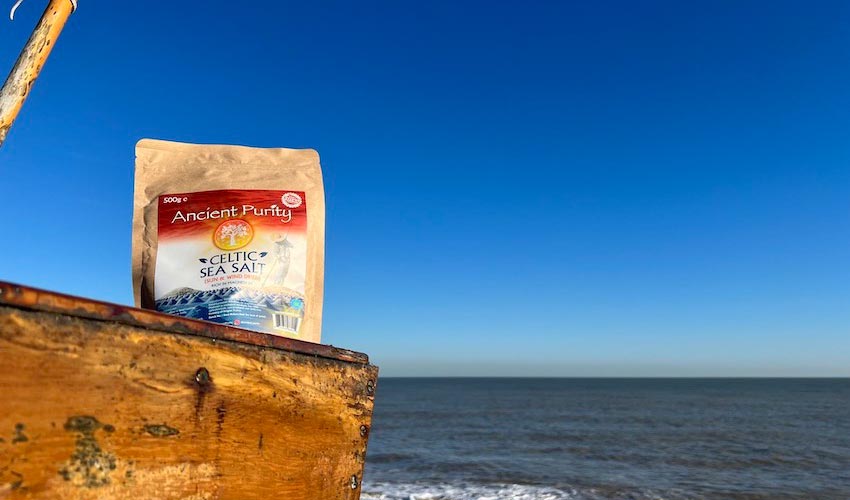Celtic Sea Salt & Blood Pressure Health
I want to tell you about blood pressure and salt, to open some horizons on the subject. But also offer some natural options for blood pressure health. Tell you about the safety and healthful benefits of Celtic Sea Salt in this subject. Conventional society suggests that salt contributes to high blood pressure by prompting the body to absorb more water. The excess sodium in the blood absorbs water, leading to increased blood volume in the vessels. Consequently, the heart must work harder, resulting in elevated blood pressure.
Contrary to common belief, reducing sodium intake may not be the solution. As explained in "Trashing the Eight Glasses of Water a Day Recommendation," while initial salt reduction may lower blood pressure, it comes at a cost. Unlike conventional table salt, Celtic Sea Salt is hailed for its rich mineral content and potential cardiovascular benefits. We will explore how Celtic Sea Salt can contribute to heart health and aid in lowering blood pressure. It's hand-harvested and sun-dried, retaining its natural balance of minerals, including magnesium, potassium, and calcium. A very different substance from table salt and nearly all commercial sea salts. Anyway let's back up a bit and look at sodium and blood pressure.

Prolonged low-sodium intake exacerbates dehydration, ultimately leading to higher blood pressure. When salt intake is extremely low, the body responds by inhibiting the kidneys from excreting sodium, thereby increasing blood volume and triggering vasoconstriction. Insufficient sodium intake forces the kidneys to retain sodium at the expense of excreting potassium and magnesium, vital intracellular electrolytes crucial for cellular hydration. Depleted magnesium and potassium levels result in increased vasoconstriction and heightened sympathetic nervous system activity, known as the stress response. The stress response releases norepinephrine, further fueling stress and elevating blood pressure. In essence, inadequate salt intake can contribute to high blood pressure.
Moreover, electrolyte imbalance, involving calcium, potassium, and magnesium deficiencies, plays a role in high blood pressure. Maintaining a proper sodium-to-potassium ratio is essential for healthy blood pressure. Potassium aids in lowering blood pressure by relaxing arterial walls, and increasing potassium intake has proven effective in reducing high systolic blood pressure. The recommended daily potassium intake was revised in 2019 to 2,600 mg for women and 3,400 mg for men, although the previous guideline of 4,700 mg is considered wiser. It is generally advised to consume five times more potassium than sodium. Increasing potassium through ripe fruits, such as watermelon, orange juice, apples, and tangerines, is a preferable strategy. Potassium supplements are discouraged, as is insufficient magnesium, which also influences blood pressure regulation.

Now let's look at oestrogen, it's often overlooked, but plays a significant role in hypertension. According to many health experts oestrogen contributes to high blood pressure by promoting nitric oxide production, which, while lowering blood pressure, interferes with mitochondrial energy production and increases insulin resistance. Oestrogen also hampers carbon dioxide production, leading to low blood oxygen levels, further contributing to high blood pressure.
Oestrogen interference with progesterone production exacerbates the problem, as progesterone helps maintain normal blood pressure by regulating blood sugar levels and reducing inflammation. Excess oestrogen and linoleic acid (LA) in processed foods can also cause water retention and swelling, similar to salt. To combat high blood pressure, addressing insulin resistance is crucial. Excess LA in tissues causes insulin resistance, leading to sodium retention and increased blood volume. ACE inhibitors and angiotensin II blockers, common blood pressure medications, target this pathway.

OK so what else could be the key strategies to normalise blood pressure. Also we will return to Celtic Sea Salt. Anyway I suggest one of your first moves is to include limit LA (linoleic acid) consumption. Make sure you optimise your Vitamin D levels. Vitamin D contribute to maintaining healthy blood pressure levels. That's a whole article really on its own.
Make sure you are balancing sodium-to-potassium ratios, ensuring sufficient magnesium and calcium intake, below I'll write about Celtic Sea Salt in this particular need. Make sure you are getting regular exercise, I mean do you need to be told? I'm walking every day, I walk a lot, I choose stairs over lifts and escalators. Now for people 40 and up you don't want to be in the gym more than 3 days a week, but there is no limit to easy more natural exercise like walking, swimming, cycling. For women I suggest you re-think oestrogen therapy, it's big subject and not time to go into here but in relation to blood pressure, I'm suggesting look for another option /options. I would say also considering supplements such as Co-Q-10, Magnesium Oil and Krill Oil. Below I'll talk Celtic Sea Salt.

Ok Celtic Sea Salt, it's not only safe to come back in, it's helpful, but always follow the sensible practice of... Start low and see how you go. It has the mineral content and the correct balance to aid in blood pressure regulation. One of the key factors that make Celtic Sea Salt beneficial for heart health is its high mineral content. These essential minerals play a crucial role in various bodily functions, including the regulation of blood pressure.
Magnesium: Celtic Sea Salt is notably rich in magnesium, a mineral associated with cardiovascular health. Magnesium helps relax blood vessels, promoting better blood flow and reducing resistance in the arteries. This can contribute to lower blood pressure levels.
Potassium: Adequate potassium intake is essential for maintaining a healthy balance of fluids in the body. Celtic Sea Salt contains potassium in a natural, unprocessed form. Potassium helps counterbalance the sodium content in the diet, potentially reducing the risk of high blood pressure.
Calcium: Calcium is vital for muscle function, including the contraction and relaxation of the heart muscle. Celtic Sea Salt's natural calcium content supports overall cardiovascular health, contributing to a well-functioning heart.
So you can still make food taste good, you don't have to flood your body with water, because you can add a little of this in. You've got some idea on supplementation and what to avoid. You already know how your lifestyle should be, choose it each day, don't think of only eating healthy for the rest of your life, just choose the day today the next meal... Right I'm hungry, I choose something nutritious. Most of all, be present, be at home in the world, relax, take it easy. Your well-being and peace of mind come first, and then if you chose you can serve others better too. Because happiness is maybe at the top of the tools to regulate blood pressure. Is happiness a tool, haha I don't think so, it's a state of being that you want to become natural to you. So practice peace and joy. Order Ancient Purity Celtic Sea Salt Here!






















